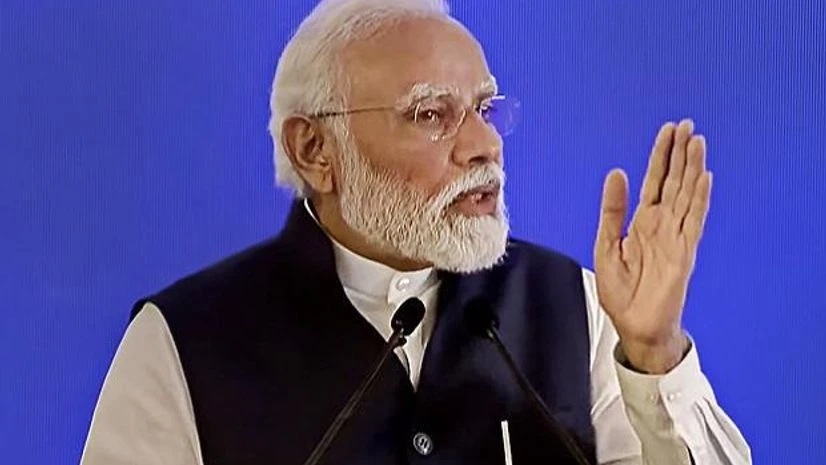Prime Minister Narendra Modi on Tuesday said India produces milk worth Rs 8.5 lakh crore annually, more than the turnover of wheat and rice, and underlined that small farmers are the biggest beneficiaries of the dairy sector.
In a veiled dig at Congress, Modi said a former prime minister used to say that only 15 paise out of one rupee reaches (the beneficiaries) after leaving Delhi, but he ensures that the entire100 paise reaches the intended beneficiaries and gets deposited into the account of farmers.
The prime minister was addressing a gathering at Diyodar in the Banaskantha district after inaugurating a new dairy complex and a potato processing plant of the Banas Dairy.
He said the cooperative dairy empowers small farmers, especially women, and strengthens the village economy.
"Today, India is the world's largest producer of milk. When the livelihood of crores of farmers depends on milk, India produces milk worth Rs 8.5 lakh crore annually. This is something that many, including renowned economists, fail to pay attention to.
"As against this, even the turnover of wheat and rice is not Rs 8.5 lakh crore. And small farmers are the biggest beneficiaries of the dairy sector," Modi said.
More From This Section
He also inaugurated and laid the foundation stones for a host of other projects of the Banas Dairy.
"The biggest beneficiaries of the dairy sector are small farmers, who hold no more than two- five bigha land and suffer from scanty rainfall and the lack of (irrigation) water. They take care of their families by raising cattle," he said.
Banas Dairy is said to be one of the leading milk production manufacturing companies in Asia.
The prime minister said that his government has always cared about farmers with small land-holdings by ensuring their well-being.
"After going to Delhi (after becoming prime minister in 2014), I took on the responsibilities of small farmers across the country. And today, I transfer Rs 2,000 directly into the bank accounts of farmers three times in a year," he said.
"A former prime minister used to say that only 15 paise out of one rupee reaches (the beneficiaries). But this Prime Minister says that the entire 100 paise reaches the houses of people to whom it is meant for after leaving Delhi, and gets deposited into the account of farmers," Modi said.
Addressing women dairy farmers on the occasion, Modi said that Banas Dairy is an example of how a cooperative movement can strengthen the economy of a village and empower women, in turn strengthening the campaign for the "Aatmanirbhar Bharat."
He also praised the women of Banaskantha for the way they care about their cattle with more affection even than their children.
Modi said that Banas Dairy has demonstrated that resources other than dairy can also be used to increase the income of local farmers. He said that Banas Dairy will set up many bio-CNG and gobar gas plants across the country, which will give a fillip to the government's campaign of turning waste into wealth.
"Many goals are being achieved simultaneously through Gobardhan (to manage cattle waste). One, it is keeping the villages clean, and secondly, cattle farmers are also getting money for cow dung," he said.
"Third, products like bio-CNG and electricity are being prepared from cow dung. Fourth, the organic manure that is available in this whole process is helping the farmers a lot," he said.
The prime minister said that the Banas Dairy has expanded its reach to provide benefits to the dairy farmers in states like Uttar Pradesh, Haryana, Rajasthan, Odisha, Andhra Pradesh, and Jharkhand.
Banas Dairy's new dairy complex and potato processing plant have been built at a cost of over Rs 600 crore to enable the processing of about 30 lakh litres of milk, produce about 80 tonnes of butter, one lakh litres of ice cream, 20 tonnes of condensed milk (Khoya) and 6 tonnes of chocolate daily.
The potato processing plant will produce products like french fries, potato chips, aloo tikki, patties etc, many of which will be exported to other countries.
The prime minister also dedicated to the nation the Banas Community Radio Station and the expanded facilities for the production of cheese products and whey powder at Palanpur, and organic manure and biogas plant.
He also laid the foundation stone of four gobar gas plants of 100 tonnes capacity to be established at four different places.
PM Modi is on a three-day visit to his home state Gujarat which he kicked off on Monday by visiting Vidya Samiksha Kendra or the Command and Control Centre for Schools, in Gandhinagar.
Later in the day on Tuesday, Modi will lay the foundation stone of the WHO Global Centre for Traditional Medicine in Jamnagar. On April 20, he will inaugurate the Global AYUSH Investment & Innovation Summit at Gandhinagar and will later attend the Adijati Maha Sammelan in Dahod and inaugurate and lay the foundation stone of various development projects.
(Only the headline and picture of this report may have been reworked by the Business Standard staff; the rest of the content is auto-generated from a syndicated feed.)

)
